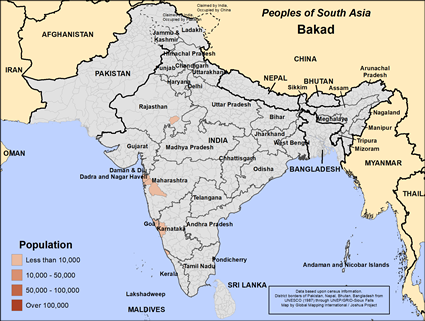Bakad in India

Send Joshua Project a photo
of this people group. |

Map Source:
People Group data: Omid. Map geography: UNESCO / GMI. Map Design: Joshua Project
|
| People Name: | Bakad |
| Country: | India |
| 10/40 Window: | Yes |
| Population: | 6,100 |
| World Population: | 6,100 |
| Primary Language: | Hindi |
| Primary Religion: | Hinduism |
| Christian Adherents: | 0.00 % |
| Evangelicals: | 0.00 % |
| Scripture: | Complete Bible |
| Ministry Resources: | Yes |
| Jesus Film: | Yes |
| Audio Recordings: | Yes |
| People Cluster: | South Asia Hindu - other |
| Affinity Bloc: | South Asian Peoples |
| Progress Level: |
|
Introduction / History
The Bakad people have a long history in India, traditionally living in rural areas and engaging in agriculture and craftsmanship. They have preserved their identity over centuries. The Bakad speak their own Hindi dialect, which incorporates elements from regional languages.
What Are Their Lives Like?
Today, the Bakad people primarily reside in rural villages. They work in agriculture, growing crops such as rice, wheat and vegetables. Many Bakad families also practice traditional crafts and trades. The Bakad place great importance on family, hospitality, and respect for elders, ensuring that their religious and cultural traditions are passed down through generations.
Their communities are tightly-knit, with a strong emphasis on family and mutual support. Despite facing economic challenges and limited access to modern amenities, the Bakad maintain a vibrant cultural life with festivals, music and traditional arts.
What Are Their Beliefs?
The Bakad people practice Hinduism, worshiping a variety of deities and observing numerous religious rituals and festivals such as Diwali, Holi, and Navratri. Their belief system emphasizes values like dharma (duty), karma (action and consequence), and ahimsa (non-violence). They also honor their ancestors through rituals and ceremonies.
What Are Their Needs?
The Bakad people need better access to quality education to provide more opportunities for their children. Improved healthcare services are essential due to the limited availability of medical facilities and high rates of preventable diseases. Economic support through modern agricultural techniques, market access and vocational training can enhance their livelihoods. Infrastructure development, including better roads, clean water supplies and reliable electricity, will greatly benefit the Bakad community. Addressing these needs will help the Bakad people achieve greater economic stability.